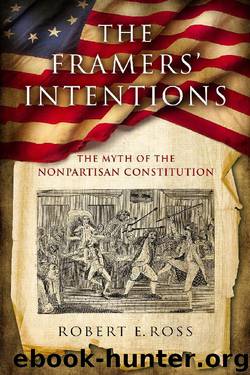The Framers' Intentions by Ross Robert E.;

Author:Ross, Robert E.; [ROSS, ROBERT E.]
Language: eng
Format: epub
Publisher: University of Notre Dame Press
Published: 2019-04-08T13:46:47+00:00
C h a p t e r 6
Partyism and the Electoral Col ege
Completing the Twelfth Amendment
Previous scholarship has rightly linked the Twelfth Amendment to the emergence and development of political parties.1 However, a history of the amendment is incomplete without connecting it to the electoral college and the method of selecting electors and allocating their votes. The framers of the Twelfth Amendment intended it to ensure that the results of the House contingency election reflected popular will. But the Twelfth Amendment alone could not ensure this result because the construction of the public will was still a product of the electoral college’s election procedure. The House could still select a candidate who did not receive the greatest number of electoral college votes. The development of party politics was intertwined with the development of the rules determining elector selection because the victor in a competitive party system could claim legitimacy only if his ascent to power was in accordance with popular will.
The electoral college is usually identified as one of the undemocratic features of the Constitution.2 Article II, Section 1, of the Constitution gives states the power to select presidential electors. However, with no clear indication of how to exercise this power, states were left to determine the most appropriate method for choosing electors and allocating votes 155
156 The Framers’ Intentions to presidential candidates. Not until 1832 did the general ticket method, or awarding all electoral col ege votes to the winner of the state popular vote, become the main method of selecting electors. From the 1790s to the 1830s, two heavily disputed questions regarding the selection of presidential electors emerged: whether states should retain plenary power over the method of selecting electors and whether the district or general ticket method was the best way to select electors. Some of the most prominent founders eventually supported the district system because they believed it was the best way to facilitate majority rule while also recognizing the votes of minorities. The district method was more in keeping with the expectations regarding presidential selection at the constitutional convention. After the convention, many political actors, including Madison, supported constitutional amendments to circumscribe state authority over elector selection and establish a uniform mode of elector selection by requiring the district system. For example, in 1817, an amendment was proposed requiring the district election of presidential electors as a way to eliminate the variation in selection based on political expediency. Proponents of the amendment believed it was more democratic; opponents, however, claimed the district system would result in undemocratic gerrymandering.
This relationship between the electoral college and majority rule became a central issue in 1824 when the House selected John Quincy Adams over Andrew Jackson in the contingency election even though Jackson received more electoral col ege votes. Supporters of Jackson, who believed he had won the election, proposed a constitutional amendment in 1826 requiring states to adopt a uniform method of selecting presidential electors by districts.3 The nature and construction of a national majority was a central
Download
This site does not store any files on its server. We only index and link to content provided by other sites. Please contact the content providers to delete copyright contents if any and email us, we'll remove relevant links or contents immediately.
The Secret History by Donna Tartt(18160)
The Social Justice Warrior Handbook by Lisa De Pasquale(11952)
Thirteen Reasons Why by Jay Asher(8451)
This Is How You Lose Her by Junot Diaz(6437)
Weapons of Math Destruction by Cathy O'Neil(5829)
Zero to One by Peter Thiel(5489)
Beartown by Fredrik Backman(5356)
The Myth of the Strong Leader by Archie Brown(5238)
The Fire Next Time by James Baldwin(5016)
How Democracies Die by Steven Levitsky & Daniel Ziblatt(4958)
Promise Me, Dad by Joe Biden(4908)
Stone's Rules by Roger Stone(4857)
100 Deadly Skills by Clint Emerson(4690)
A Higher Loyalty: Truth, Lies, and Leadership by James Comey(4550)
Rise and Kill First by Ronen Bergman(4545)
Secrecy World by Jake Bernstein(4388)
The David Icke Guide to the Global Conspiracy (and how to end it) by David Icke(4380)
The Farm by Tom Rob Smith(4323)
The Doomsday Machine by Daniel Ellsberg(4245)
